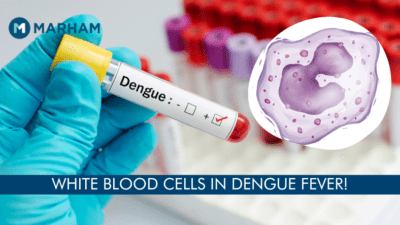Dengue cases are on the rise in several major cities of Pakistan. More than 74 new cases were reported yesterday in Rawalpindi, which counts for the most cases found in a single day. Hospitals are filling with dengue patients, and there is panic and fear among the people.
Platelets and WBC count in dengue are both the main focus in the recovery of this disease. According to data, dengue fever is distinguished by leucopenia (WBC less than 5000 cells/mm3), thrombocytopenia (less than 150,000 cells/mm3), increasing hematocrit (5-10%), and no indication of plasma leakage.
A decrease in white blood cells in the body is known as Leucopenia. The body mainly requires White blood cells to fight diseases and infections. Since the dengue fever causes a decrease in their number it gets harder for a dengue patient to recover.
“White blood cell production during the recovery phase is a good indicator about the recovery of dengue fever rather than focused on platelet counts production,” says research that examined the relationship between white blood cells and platelets during dengue hemorrhagic fever recovery in 2014.
WBC Count in Dengue Fever:
White blood cells are formed in the human bone marrow and remain in your lymphatic system until they are needed to combat a virus, bacterium, or another contaminant that enters your body. The greater your WBC count, the less likely you are to contract a viral illness.
Dengue virus can infect a wide range of white blood cells, including monocytes, dendritic cells, Kupfer cells, B cells, bone marrow, and those in the lungs. Leukocytes, particularly monocytes, play critical roles in eliminating the dengue virus.
Research conducted in 2013 says that the Dengue virus attacks monocytes and exploits them for reproduction, prompting monocytes to undergo apoptosis to prevent spreading via several methods.
The clinical manifestations of dengue fever include moderate sickness to severe disease exacerbated by bleeding, fluid leakage, and shock.
So, How to Increase the WBC Count in Dengue Fever?
While there are numerous remedies to increase WBC count in dengue online there is not much scientific evidence to support the effectiveness of these methods.
However, a case report called The Effect of papaya leaf juice on Platelet and WBC Count in dengue fever has found:
“The administration of papaya leaf juice was found to be beneficial in increasing the platelet and white blood cell count in the case of dengue reported. This fact is well established by various experimental studies and clinical trials cited earlier. Hence it can be concluded that papaya leaf juice would definitely prove beneficial to mankind at large owing to the cost-effectiveness and easy availability of the papaya plant.”
Vitamin C has been proven to promote the development of white blood cells called lymphocytes and phagocytes, which assist the body fight infection. Therefore, citrus fruits like oranges, berries, grapefruits, etc., are said to be effective in the treatment of dengue fever due to their Vitamin C content.
Lastly, a study shows early fluid resuscitation and frequent monitoring are the primary life-saving interventions in dengue. Most dengue patients need hospitalization by the third day of fever to receive the necessary amounts of fluid.
If this critical period is missed, the disease process has a significant probability of developing into a severe form, which can lead to death. Click here to book an appointment with the Best Doctors for Dengue today via Marham.

